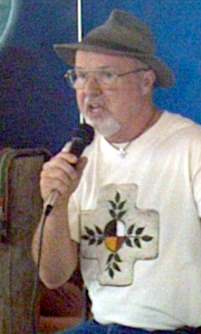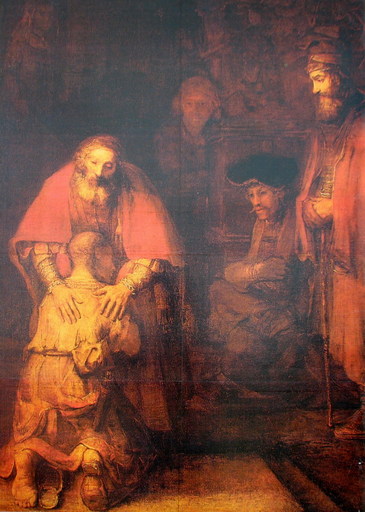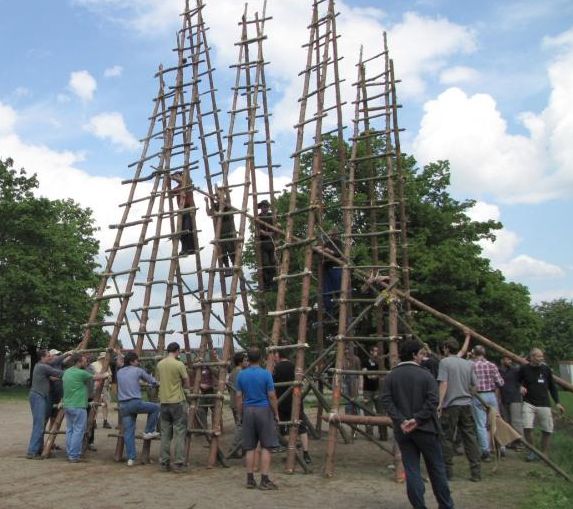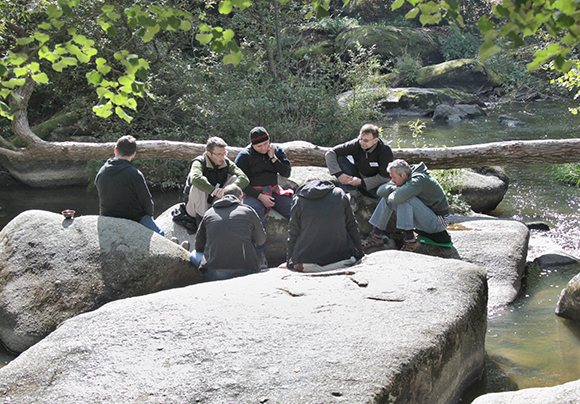
Starý muž, který se neumí smát, je trouba.
Richard Rohr
Kdo jsme?
Tento web reprezentuje hnutí Chlapi, neformální společenství mužů, kteří hledají takové způsoby duchovního prožívání, se kterými se dokážou jako muži ztotožnit a celou bytostí je žít.
Můžeš se tady setkat s muži, kteří usilují o to být lepšími a více autentickými.
Vytváříme jak reálný tak virtuální prostor pro setkávání.
Začalo to někdy před rokem 2000 hledáním mužské energie, spirituality i chlapské party a setkáváním v malých skupinách. Pokračovalo to inspirací dílem Richarda Rohra a jeho Rituálem pro přechod do zralé dospělosti a pokračuje to dodnes stovkami setkání v malých skupinách, víkendovými akcemi pro muže i pro otce a děti, rituály i celostátními setkáními pro stovky účastníků a mezinárodní spoluprací s hnutím mužů po celém světě.
Pro řadu z nás je podstatné přátelství s Bohem, pro všechny jsou oporou kamarádi, které tu nalezli.
Vítáme tě mezi námi a těšíme se na společné putování.

Pavel Hrdina a Martin Šmídek
Překlad meditace CAC ze čtvrtka 29. 5. 2025
na téma:
Přijetí stínu
| Kolektivní stín: Nenávist převlečená za lásku Jen proto, že ego, chamtivost a nenávist dělají cosplay jako náboženství, nechci, abychom tomu dávali takový kredit. Chci, abychom trvali na tom, že ne, existuje skutečné náboženství! -Omid Safi V epizodě podcastu CAC Všechno patří vede pracovník CAC a básník Drew Jackson dialog s hostem Omidem Safím, básníkem a islámským učencem. Jackson se ptá: "Co je to za otázku? Jak může poezie podpořit naše úsilí o mír, zejména v konfliktním prostoru mezi náboženskými identitami? Omid Já zásadně nevěřím, že na tomto světě existuje náboženský konflikt a napětí. Na tomto světě je konflikt! Na tomto světě existuje genocida - sledujeme ji už rok a půl. Existuje rasismus, existuje hladomor a úmyslné vyhladovění lidí. Je tu okupace. Děje se spousta odporných věcí. Myslím si, že je to ego, chamtivost a sobectví, které staví malé já individuálně, komunitně, národně a rasově na trůn špatnosti a staví, jak říkával bratr Martin [Luther King mladší], právo navždy na popraviště.[1] Chamtivost, ego a nenávist rády dělají cosplay [2]..... Jejich oblíbenými kostýmy jsou věci, které jsou ze světla, včetně náboženství. Chci, abychom se nad touto otázkou skutečně posadili: Je v tomto světě skutečně náboženský konflikt s tím, co nás učí naše náboženské tradice? V jádru židovské víry, té krásné ušlechtilé tradice: Buďte laskaví k cizincům, neboť vy sami jste byli kdysi cizinci v Egyptě (5. Mojžíšova 10,19). Náš milovaný Kristus: Buďte laskaví k chudému, sirotku, nuznému, vdově; co činíte nejmenšímu z nich, mně činíte (Mt 25,40). Náš milovaný prorok Mohamed: Že křik sirotka stoupá až k Božímu trůnu a otřásá jeho mocnými základy [3] Tito lidé pijí ze stejného pramene. Koupou se ve stejném světle. Chci, abychom dokázali rozeznat smysl oné krásné modlitby přeloženo DeepL | Collective Shadow: Hate Disguised as Love
Just because ego and greed and hatred are doing cosplay as religion, I don’t want us to give it that much credit. I want us to insist that no, there is real religion! —Omid Safi In an episode of CAC’s podcast Everything Belongs, CAC staff member and poet Drew Jackson dialogues with guest Omid Safi, a poet and Islamic scholar. Jackson asks: How might poetry support our efforts for peace, particularly in the conflicted space between religious identities? Omid I fundamentally do not believe that there is religious conflict and tension in this world. There’s conflict in this world! There is genocide in this world—we’ve been watching it for a year and a half. There is racism, there is starvation, and the intentional starvation of people. There’s occupation. There’s lots of hideous things happening. I think that’s ego, and that’s greed, and that’s selfishness that’s putting the small self individually, communally, nationally, and racially on the throne of wrong and to put, as Brother Martin [Luther King Jr.] used to say, the right forever on the scaffold. [1] Greed and ego and hatred love to do cosplay [2].… Their favorite costumes are the things that are of light, including religion. I want us to really sit with that question: Is there actually religious conflict in this world with what we find our religious traditions teaching us? At the heart of the Jewish faith, that beautiful noble tradition: Be kind to the stranger for you yourselves were once strangers in Egypt (Deuteronomy 10:19). Our beloved Christ: Be kind to the poor, the orphan, the needy, the widow; that which you do to the least of these, you do unto me (Matthew 25:40). Our beloved Prophet Muhammad: That the cry of the orphan rises all the way up to the throne of God and shakes it to its mighty foundation. [3] These folks are drinking from the same fountain. They’re bathed in the same light. I want us to be able to discern the meaning of that beautiful prayer of the |
Zde se nacházejí překlady Daily Meditations, jejichž anglické originály se nacházejí na webu CAC. V den jejich vydání je zde nalezneš přeložené strojově pomocí DeepL, zpravidla do druhého dne pak projdou jazykovou úpravou někým z týmu překladatelů :-) Pokud vládneš dobrou angličtinou, přihlas se asi raději přímo u zdroje těchto úvah, tedy na webu CAC. Budeš je pak do své mailové schránky dostávat již k ranní kávě. -mš-
 Myšlenka Richarda Rohra na pondělí čtvrtého týdne v mezidobí - Bůh tě miluje Přečtěte si chvalozpěvy sv. Františka od začátku do konce. Vše, co svatý František považuje za potřebné konat, je chválit Boha. To se postará o všechno ostatní. Nechává totiž Boha být Bohem. František velebí Boha pro to i ono. V každé situaci, jakkoli se v daném okamžiku může zdát nešťastná nebo obtížná nebo absurdní …
Myšlenka Richarda Rohra na pondělí čtvrtého týdne v mezidobí - Bůh tě miluje Přečtěte si chvalozpěvy sv. Františka od začátku do konce. Vše, co svatý František považuje za potřebné konat, je chválit Boha. To se postará o všechno ostatní. Nechává totiž Boha být Bohem. František velebí Boha pro to i ono. V každé situaci, jakkoli se v daném okamžiku může zdát nešťastná nebo obtížná nebo absurdní …




